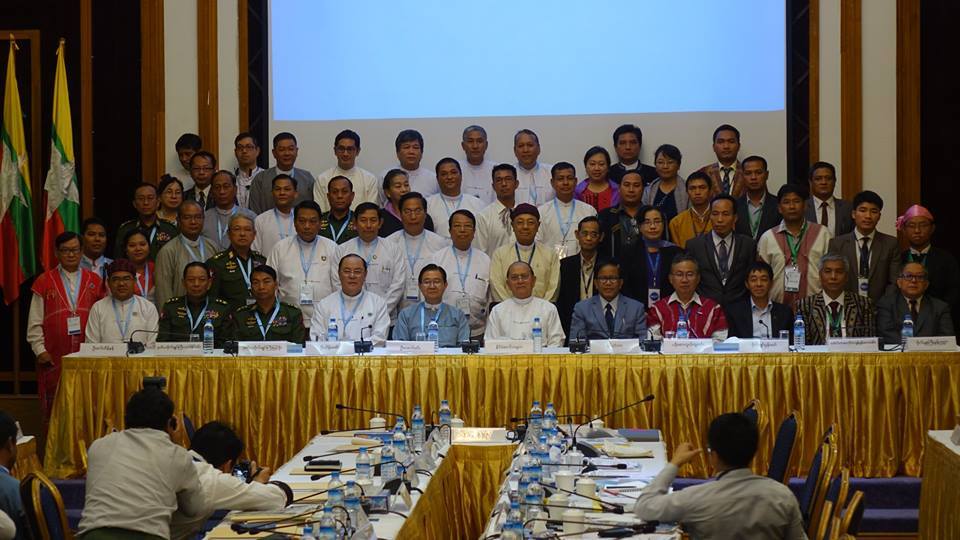On Tuesday, representatives of the Burmese government and ethnic armed groups signed a draft ceasefire agreement, that will now be taken back to their respective leaderships for approval. But the initial excitement – that painstaking years of negotiation have finally borne fruit – has quickly given way to the realisation that the paperwork is just the first in a long series of steps towards a distant peace.
DVB has conducted a poll amongst its readers, asking whether they believe a nationwide ceasefire agreement, or Nationwide Ceasefire Agreement (NCA), would be signed before the general election. Opinion is divided (currently 55 percent say they do believe the ceasefire agreement will be ratified), so we asked some of the country’s leading political voices what they thought of the NCA and Burma’s prospects for peace.
Pho Thaukkyar, veteran journalist
“At the moment, I don’t see much excitement amongst Burmese people on the news about the NCA. The people have been tricked so many times that nowadays they are sceptical. I am one of those people. I can only hope and pray that the key players have honest intentions. Burma’s people have been longing for peace, but it’s still too early to say that a new chapter has been opened in Burma’s history until the agreements are practically implemented.”
Aye Maung, Rakhine National Party
“I welcome this news. The first step of the peace process has been successfully finished, and it is an important step. But in order to make it meaningful, the peace process must continue. We hope that leaders from both sides will make constructive use of this recent outcome. It will be delightful if the political dialogue, the next major step in the peace process, can be facilitated in the manner of a genuine union. I hope that we will find success in the political dialogue, too.”
Sai Nyunt Lwin, vice-chairman, Shan Nationalities League for Democracy
“Many people think the draft NCA is a done deal. The president was clearly delighted when he went to the Myanmar Peace Centre. But I checked, and while the government is determined to sign the NCA, the ethnic representatives of the NCCT [Nationwide Ceasefire coordination Team] must seek approval from their respective leaderships, so they may propose some minor changes to the draft, though I assume there won’t be anything major. My concern is that in order to finalise the ceasefire negotiations, some unresolved issues have been shelved until future meetings, such as the political framework and political dialogue.”
Naw Zipporah Sein, vice-chairperson, Karen National Union
“The NCCT does not have a mandate to sign the NCA as a whole. The NCA will only be signed after respective ethnic groups and leaders have reviewed the points. I also think that the conflict raging in the country’s north is an important issue, and that the NCA must include strategies for dealing with it.”
Nan Khin Htwe Myint, spokesperson, National League for Democracy
“It is good that an agreement has been reached, and we hope that it will hold. There have been cases in the past when such an agreement was reached but later abandoned. The ideal would be for the agreement points to hold until the next round of talks. Nonetheless, we are delighted to hear the news and generally assume the agreement is solid as it came as a result of numerous rounds of negotiation. We are keeping our hopes up for peace.”
[related]
Khin Maung Shwe, chairman, National Democratic Force
“I am delighted to hear this news – I have been waiting for it for so long. As a politician, being engaged in politics without peace in the country is like eating a curry without salt … National reconciliation, socio-economic growth for the rural public and implementing a democracy system and genuine union-building depend on peace. If we can bring about peace in the country, many of our needs will be fulfilled. If the participants in the upcoming ethnic group meetings can consider the people’s interests, and not just their own personal gain, then I think we will get to witness and applaud the signing of the Nationwide Ceasefire Agreement.”
Saw Than Myint, vice-chair, Federal Union Party
“I don’t want to see the same events from back in the days of the [former military junta ruling party] State Law and Order Reconciliation Council when a ceasefire was signed, but battles continued to rage. The people in our country have suffered too much from war. Right now, I’m in the town of Mogaung in Kachin State … The situation is affecting the locals’ daily lives. They cannot move around and make a living peacefully. We hope their suffering will be reduced.”
Julia Marip, general secretary, Women’s League for Burma
“As women and citizens of Burma, we welcome the news with delight – but we are also concerned by the ongoing clashes and military offences during the ceasefire negotiations; and for the safety of women, who are more vulnerable in conflict. We are also concerned about the varied restrictions and obstructions that prevent women from taking part in the peace process.”



